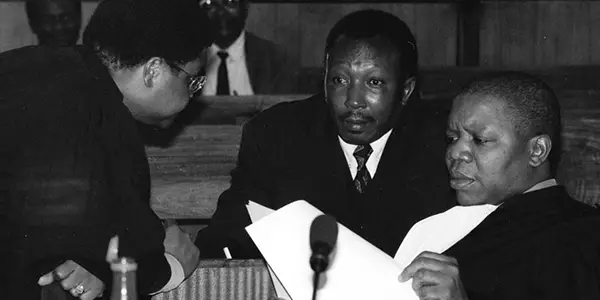The Uncondemned, directed by Michele Mitchell and Nick Louvel, tells the story of a group of young international lawyers and activists who fought to have rape recognised and prosecuted as a war crime. Underfunded, inexperienced and overwhelmed, they faced huge hurdles as they pursued their first case against a small town mayor in Rwanda.
Crimes of war against humanity had not been prosecuted since post-WWII, and surviving witnesses feared to come forward amongst death threats against them and their families. The film documents the brave Rwandan women who came forward to testify and win justice for the crimes committed against them.
A Bit of Context
Despite rape being recognised as an international war crime since 1919, no one had ever been prosecuted for it prior to 1997 during the trial of Jean-Paul Akayesu, which was part of the International Criminal Tribunal for Rwanda. However, even though rape during war has been a recurrent feature of wars throughout history, it has always been looked upon as a by-product of conflict, and not an effective military policy.

As explained in the documentary, these systematic sexual assaults are something that destroys not just the individual but the familial fabric, the social fabric and the economic fabric of a society. It is something that is used against a population to make it submit. Due to the tireless efforts of the men and women shown in this film, rape was tried for the first time as a war crime and as an aspect of genocide.
Legal Jargon and a Dull First-Half
The structure is in the style of courtroom dramas, moving between archival footage, sound from the testimony and court proceedings, as well as recent interviews with the integral people that are part of the operation. They describe the push-backs from the tribunal to include rape as a war crime charge for the trial of Jean-Paul Akayesu.
Whilst some of it was very interesting, I found the first half of The Uncondemned difficult to follow. I had little knowledge of the events that occurred in Rwanda in the 1990s other than being aware of some of the terrible events that had occurred against the Tutsi people. The documentary offers little information about the events leading up to the tribunal and subsequent trial.
Many different faces and places are mentioned without much contextualisation that would help the viewer understand the twists and turns of this plot coherently. There are no names or titles overlayed during the modern interview sequences that could help you grasp who is who, and I believe that would have helped a lot with getting to grips with the story. A lot of legal jargon is used, which made it difficult for someone with little to no legal knowledge understand what was going on.
Heartbreakingly Human Conclusion
The last half is where The Uncondemned reaches its climax – during the buildup we are introduced to four Rwandan women who have formed a support group for the rape victims of their village spurred by the victim herself, Godelieve Mukasarasi, and some of the lawyers and activists supporting the case.
She realised that it was killing the women to be silent about their trauma, due to culturally not talking about their bodies and the shame associated with the violent assaults they had endured. You immediately are rooting for these women to testify against the mayor Jean-Paul Akayesu and to break the cycle of silence and shame for these victims, especially when they are flown to speak in front of the UN. It makes you feel uplifted and inspired by these amazing women.
Overall, this is a subject matter that outshines its documentary. It lacks contextualisation for the interviewees and makes the first half hard to follow. However, it is the brave women and the inspiring conclusion of The Uncondemned that makes it a heartbreaking, human, and empowering watch, and it reveals an important part of forgotten history.
Do you think it’s important for a documentary to give you the context of the subject matter? Or do you think you should do some research before you watch it?
The Uncondemned was released on October 21 and 28, 2016 in NYC and LA.
Does content like this matter to you?
Become a Member and support film journalism. Unlock access to all of Film Inquiry`s great articles. Join a community of like-minded readers who are passionate about cinema - get access to our private members Network, give back to independent filmmakers, and more.